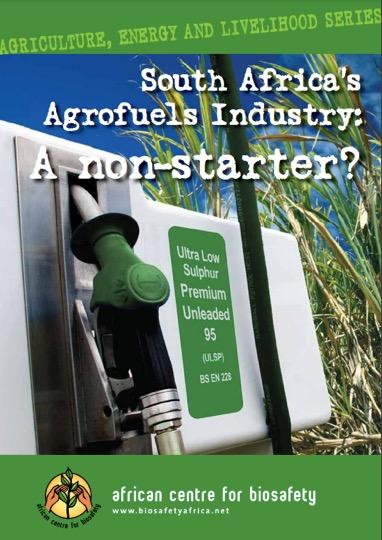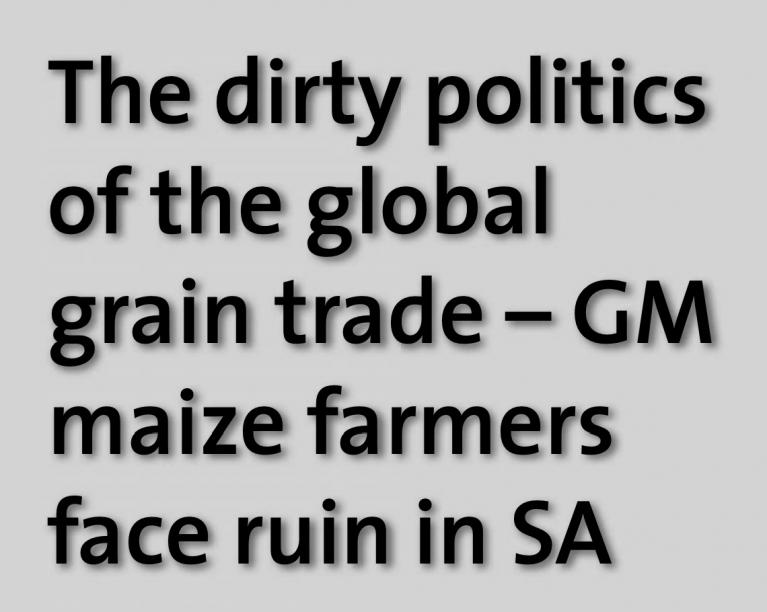Latest Agribusiness Resources
16 May 2011
Activists approach Competition Commission to Investigate Monsanto’s dominance in South Africa
Several groups in South Africa, including the African Centre for Biosafety (ACB), the Surplus People Project (SPP), Trust for Community Outreach (TCOE), the Food Sovereignty Campaign and Biowatch South Africa submitted a detailed report to the Competition Commission in support of their requests that the Commission investigate Monsanto’s extraordinary market power in South Africa. The […]
READ24 March 2011
South Africa’s Agrofuel’s Industry: A non-starter?
This paper provides a brief overview of the biofuels industry in the context of the South African government’s 2008 policy. Our key finding is that the large-scale biofuels industry has stagnated almost to the point of non-existence. There is, however, a growing impetus to address the shortcomings in government policy that has held the industry […]
READ8 December 2010
Competition Commission rejects Pioneer Hi Bred seed takeover
Media Advisory from the African Centre for Biosafety Johannesburg, 8th December 2010. The African Centre for Biosafety applauds the decision of the Competition Commission not to approve the take-over of Pannar Seed, South Africa’s largest seed company, by the multinational corporation and seed giant, Pioneer Hi-Bred, a subsidiary of the DuPont chemical company. The ACB […]
READ10 November 2010
Opposition to Pioneer Hi Bred’s merger with Pannar, submitted to Competitions Commission
As a stakeholder, the ACB was requested by the Competition Commission to make written comments on the proposed merger between Pioneer Hi Bred and Pannar, which we submitted to the Commission on the 21st of October, 2010. In this submission, we raise the following further pertinent issues: We provide in several annexes, the seeds under […]
READ15 October 2010
Watchdog condemns moves to include maize in biofuels strategy
The African Centre for Biosafety (ACB) is deeply concerned about the Minister of Agriculture, Forestry and Fisheries (DAFF), Tina Joemat-Petersson’s statements on 8th of October 2010 that South Africa’s biofuels strategy should be revised to include maize. The Minister’s stance has been influenced by the huge surplus of conventional and GM maize produced by South […]
READ8 September 2010
The dirty politics of the global grain trade – GM maize farmers face ruin in SA
Recently, the South African press reported on the possible bankruptcy faced by maize farmers. The African Centre for Biosafety (ACB) has today released a new report titled “The dirty politics of the global grain trade – GM maize farmers face ruin in SA” which provides an analysis of why South Africa’s record 13 million ton […]
READ17 April 2010
An Open Letter to Oxfam America
Sent from the following concerned groups: African Center on Biodiversity, South Africa (Mariam Mayet, Executive Director) Bharatiya Krishak Samaj/Indian Farmers Association, India (Krishan Bir Chaudhary, President) Center for Food Safety, U.S. (Debi Barker, International Director) CNOP (Coordination Nationale des organizations Paysannes/ National Coordination of Peasant Organizations), Mali (Ibrahima Coulibaly, President) Grassroots International, US (Nikhil Aziz, […]
READ13 February 2008
South Africa’s Biofuels Strategy: greenwashing agribusiness interests
The impetus for the establishment of a biofuels industry in South Africa also came from industry lobbyists under the banner of the Southern African Biofuels Association (SABA). Consequently, the South African government published a feasibility report and a draft Biofuels Industrial Strategy in 2006, which proposed the establishment of a mandatory bioethanol target of 8% […]
READ28 January 2008
Agrofuels in South Africa – projects, players and poverty
The South African government has readily embraced the establishment of an agrofuels industry, citing job creation, the need for clean and renewable energy and the creation of markets for small-holder farmers, as key motivators. Nevertheless, it is our view that the logic of the Biofuels Strategy to introduce large-scale, mono-crop agriculture into the former homelands […]
READ




